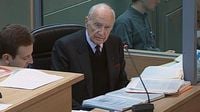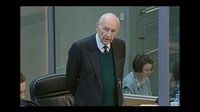On April 16, 2025, France 3 will broadcast the documentary 'Le procès de Maurice Papon' as part of its 'Crimes contre l'humanité' collection, starting at 21h05. This three-part series delves into the life and trial of Maurice Papon, a high-ranking official under the Vichy regime, who oversaw the deportation of hundreds of Jews during World War II. The documentary is also available for viewing on france.tv.
Papon’s actions during the war have long been a subject of controversy. In 1942, while serving as the prefect of the Gironde, he was instrumental in the deportation of approximately 1,600 Jews to concentration camps. His role in these events remained largely unexamined until 1981 when the journal Le Canard enchaîné published a report detailing his involvement, leading to a complaint for crimes against humanity.
After 16 years of legal proceedings, Papon's trial finally commenced in 1997. Accused of complicity in the deportations, he defended himself by claiming he was merely following orders from the government and was under duress from Nazi occupiers. However, the prosecution argued that he possessed a conscious awareness of his actions and their consequences.
The trial, which lasted over six months, culminated in a conviction in 1998, where Papon was sentenced to ten years in prison. His release in 2002, due to health issues, sparked further debate about justice and accountability in France regarding its wartime actions.
As the documentary reveals, Papon's demeanor during the trial was striking. He exhibited arrogance and indifference, showing little empathy for the victims of his decisions. His confidence turned to anger when confronted with evidence of his involvement, and he even went so far as to compare himself to Captain Dreyfus, a reference that stirred emotions, particularly among the relatives of Jewish victims present in the courtroom.
This comparison highlighted Papon's inability to recognize the gravity of his actions and the suffering of those he affected. It painted a picture of a man who, despite not being overtly antisemitic, acted out of self-interest and a lack of compassion. The documentary's creators, Gabriel Le Bomin and Valérie Ranson Enguiale, aimed to capture this complex psychological profile through extensive research, including 360 hours of recorded court hearings.
In a statement, Le Bomin emphasized, "Papon is not a criminal ideologue; he is a bureaucrat who chose to serve the state under the Vichy regime. The circumstances of the German occupation forced him to make a critical choice: to obey iniquitous orders or resign. He chose to stay in his position and enforce those orders. This decision is what we must reckon with today."
The documentary serves as a crucial moment for France to confront its past, particularly the role of high-ranking officials in the collaboration with Nazi Germany. This reckoning was notably encouraged by President Jacques Chirac's 1995 speech, where he acknowledged the French state's responsibility in the deportation of Jews, marking a significant shift in the national narrative.
Le Bomin and Ranson Enguiale utilized a wealth of literature produced during and after the trial, alongside the recorded testimonies, to create a narrative that immerses viewers in the judicial process. They consulted historians and legal experts to ensure the accuracy and depth of the content presented in the documentary.
Moreover, the film captures not just the legal proceedings but also the emotional weight carried by the testimonies of the victims and their families. The documentary aims to provide a comprehensive view of justice in action, allowing viewers to witness the trial's intensity and the profound implications of Papon's actions.
Papon's trial remains a significant chapter in France's historical narrative, symbolizing a broader struggle to come to terms with the complicity of its state apparatus during one of history's darkest periods. The documentary not only recounts these events but also challenges viewers to reflect on the moral responsibilities of individuals in positions of power.
As this documentary airs, it invites a renewed conversation about accountability, memory, and the importance of historical reflection in shaping a just society. The portrayal of Maurice Papon as a self-serving bureaucrat serves as a reminder of the complexities of human behavior in times of moral crisis.
In the end, 'Le procès de Maurice Papon' stands as a testament to the enduring impact of the past on contemporary discussions about justice and the responsibilities of public officials. It is a critical reminder that the choices made by individuals in power can have far-reaching consequences, and that understanding this history is essential for ensuring it is never repeated.





